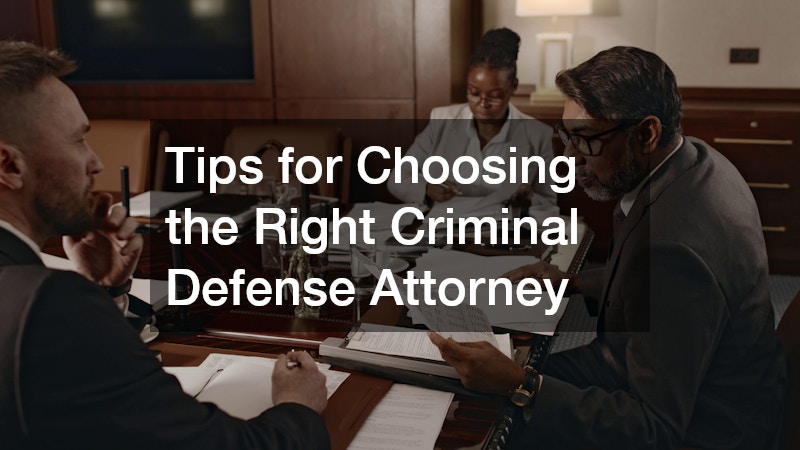Disclaimer: This website shares legal information for educational purposes only and does not constitute legal advice. Please consult a licensed attorney for advice specific to your situation.
Choosing the right criminal defense attorney can significantly affect the outcome of a legal case. This article will provide crucial tips and guidance on selecting a competent legal representative.
What Qualities Should You Look for in a Criminal Defense Attorney?
Experience and Specialization
It’s crucial to assess an attorney’s experience in criminal law and whether they specialize in cases similar to yours. An experienced attorney with a specialization in a relevant field can increase the chances of a favorable outcome in your case.
Having dealt with similar cases before, specialized attorneys are more familiar with the intricacies and nuances of your legal situation. Their past exposure equips them to anticipate potential challenges and devise effective defense strategies.
Specialization also means that the attorney likely keeps abreast of the latest legal developments in that area. This knowledge is vital for mounting an effective defense based on current laws and precedential cases.
Reputation and Track Record
The reputation and success rate of an attorney in past cases can give insight into their capability in handling your defense. A strong track record often indicates a lawyer’s diligence, strategic acumen, and their proficiency in court.
Client testimonials and peer reviews are valuable resources for evaluating an attorney’s reputation. Positive reviews emphasize qualities such as reliability, tactical intelligence, and a high level of professionalism.
Being recognized by legal associations or receiving awards signifies an attorney’s commitment to excellence. A lawyer with a reputable track record is a testament to their effectiveness in achieving positive results for clients.
How Important is Communication with Your Attorney?
Accessibility and Responsiveness
Your attorney should be accessible and responsive, maintaining open lines of communication throughout the legal process. Effective communication ensures that you are up-to-date with case developments and allows you to clarify doubts or concerns promptly.
A responsive attorney alleviates the stress associated with legal proceedings, as clients can rely on timely updates. This level of accessibility reinforces trust in the attorney-client relationship.
Moreover, consistent communication can prevent unnecessary misunderstandings regarding case strategies or courtroom tactics. Such clarity and mutual understanding enhance the chances of a successful defense.
Clarity and Transparency
A good attorney should clearly explain the legal strategy and keep you informed of any developments in a manner that’s easy to understand. This clarity helps you make informed decisions about your case and strengthens your confidence in the process.
Transparency in communication goes beyond simple clarity; it involves candid discussions about potential outcomes, risks, and challenges. An attorney who shares such insights ensures that there are no unwelcome surprises as the case unfolds.
Furthermore, transparency about the potential length of proceedings and critical milestones aids in managing expectations. This openness contributes significantly to building a strong client-attorney partnership.
What is the Role of Fees and Costs in Selecting an Attorney?
Understanding Fee Structures
Comprehend the fee structure to ensure there are no unexpected costs, and the services provided are valued fairly. Understanding whether fees are flat, hourly, or conditional can aid in budgeting for legal expenses.
An explicit fee agreement alleviates potential financial stress and sets clear expectations for both parties. This transparency reduces the likelihood of disputes regarding fees down the road.
Additionally, discussing possible ancillary costs such as court fees or expert witness fees can help in creating a realistic budget. Proper financial planning is an integral part of a strategic defense.
Evaluating Cost vs. Quality
While considering legal fees, weigh the cost against the quality and expertise offered by the attorney. Opting for the cheapest option may not always result in the best legal outcome.
Higher fees often reflect greater experience, specialization, and a history of successful case outcomes. This expertise can be invaluable in complex criminal cases, where stakes are inherently high.
Ultimately, investing in a qualified attorney offers greater peace of mind and increases the potential for success in your defense. Balancing cost and quality ensures that you receive value for your investment.
How Can Client-Attorney Compatibility Affect Your Case?
Trust and Confidence
Building a foundation of trust and feeling confident in your attorney’s abilities can enhance your legal defense experience. Trust ensures open communication and a willingness to discuss sensitive case details.
An attorney who instills confidence can alleviate some of the anxiety associated with criminal charges. This assurance fosters a collaborative and productive working relationship.
Moreover, trust allows for honest feedback and discussions, encouraging mutual respect and understanding. In criminal defense, such a rapport can be a powerful tool for navigating legal challenges.
Understanding and Agreeing on Strategies
Both you and your attorney should agree on the defense strategies, ensuring a shared vision and approach. Agreeing on strategies helps prevent conflicts or misunderstandings in crucial court proceedings.
Strategic alignment also ensures that the defense is consistent with the client’s objectives and values. When both parties are on the same page, it enhances the credibility and coherence of the defense.
Discussing possible strategies beforehand allows for assessing the risks and benefits of each approach. This planning aligns expectations and prepares both the client and attorney for potential outcomes.
In conclusion, selecting the right criminal defense attorney involves evaluating experience, communication, costs, and compatibility. Making an informed decision will provide the best chance for a favorable outcome in your case.

